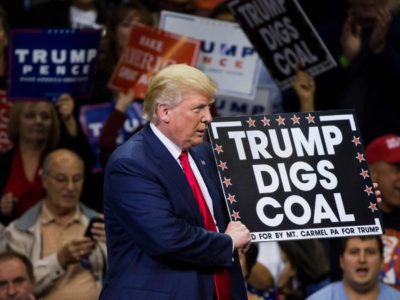Climate Denial and the Republicans: The Poor Man’s Anticommunism
 Why is the Republican Party so wedded to climate denial? As Dan has noted, not a single Republican candidate in the 2010 Senate elections could acknowledge the reality of climate change. Shortly after taking the majority in the House, the House Energy and Commerce Committee declared climate change to be a hoax. But this seems to be at odds with both the facts and with conservative ideology. After all, there are policies that good conservatives could support to mitigate climate change — most notably, a revenue-neutral carbon tax.
Why is the Republican Party so wedded to climate denial? As Dan has noted, not a single Republican candidate in the 2010 Senate elections could acknowledge the reality of climate change. Shortly after taking the majority in the House, the House Energy and Commerce Committee declared climate change to be a hoax. But this seems to be at odds with both the facts and with conservative ideology. After all, there are policies that good conservatives could support to mitigate climate change — most notably, a revenue-neutral carbon tax.
The other day, it suddenly dawned on me. My friend and colleague Mark Kleiman has previously noted one profound truth about the current GOP, viz.:
Today’s Republican Party is a coalition between those who want to repeal the New Deal and those who want to repeal the Enlightenment.
The problem with such a coalition, of course, is that the two wings feel strongly about policies that have little to do with each other. Many if not most hedge-fund managers are pro-choice and believe in the separation of church and state; many evangelical Christians do not feel that closing the carried-interest loophole puts us on the Road to Serfdom (although that might be changing).
But consider this: climate denial represents a perfect sweet spot, a place where plutocrats and theocrats can agree not for expedience but in principle.
Plutocrats like the Koch Brothers hate climate change regulation because it is regulation; it is an example of the government telling them that they cannot do something because it might hurt other people, and of course the Koch Brothers (like all toddlers) hate being told that they are not perfect. For theocrats, the necessity of climate change policy means acknowledging the reality and validity of scientific investigation; it requires conceding that not all possible knowledge is contained in Scripture.
So when a plutocrat declares that climate change is a hoax, theocrats will not simply support them because they are on the “right side”: they will vigorously cheer, sensing some sort of kindred spirit. The two wings of the Republican coalition are worshipping a different God — theocrats worship the God of the Book of Revelation, and the plutocrats worship Ayn Rand — but because climate denial answers their deepest ideological needs so perfectly, they can agree. Any attacks on climate policy by one wing reinforce the prejudices of the other wing, creating a sort of ever-increasing group polarization, i.e. “the tendency for groups to make decisions that are more extreme than the initial inclination of its members.” That’s not the case with, say, banning abortion in the case of rape, or expanding tax shelters in the Caymans.
Now, in fact, Mark’s description of the modern Republican Party ignores the so-called “third leg” of the original Reagan coalition: in addition to plutocrats (economic conservatives) and theocrats (social conservatives), there were also foreign policy hawks, sometimes also referred to as neoconservatives. Why would they care about climate change? And how would it contribute to group polarization?
Foreign policy neoconservatism represents a highly militarized view of national security policy. Every issue is a replay of Munich; every difficulty with the use of military force can be solved through the application of more military force. Neoconservatives are thus strongly skeptical, to say the least, of international institutions, and particularly international institutions that seek to develop treaties and other forms of international law. Irving Kristol, the intellectual founder of neoconservatism, initiated his foreign policy journal, The National Interest, by calling for “global unilateralism,” a shrewd way of combining conservative hatred for other nations with a forward and essentially militarized foreign policy.
Now consider climate change policy. By definition, it will involve some sort of multilateral accommodation in the service of creating a global public good. In short, it will involve creating some form of international rules to bind nations; “good guys” and “bad guys” on the order of Hitler and Stalin simply do not exist in the climate change area. In short, then, climate change policy undermines the entire world view of global unilateralist neoconservatism. In order to adopt proactive climate policies, then, neoconservatives will have to acknowledge that their national security paradigm is outdated, and at least consider the possibility of international institutional cooperation. No wonder they hate it!
In sum, then, climate denial represents the poor man’s version for the Republican Party of what anticommunism did for the postwar Conservative Movement: it strokes the ideological erogenous zones of the three pillars of the rapidly decaying Reagan coalition. Plutocrats hated communists because they hated socialism and the state; theocrats hated communism because it was godless; and neocons hated communism because doing so gave them an implacable totalitarian enemy with which to plan military confrontation. But anticommunism did the job much more effectively, of course, mainly because the Soviet Union was in fact 1) a genuine adversary to the United States, and 2) a system of monstrous evil.
It helps when facts actually can support your ideology. In the case of climate change, the facts undermine the ideology. But climate denial’s role as ideological and political glue is so useful that it remains in place. For Republicans, I suppose, that is far more important than the fate of the earth.






Reader Comments